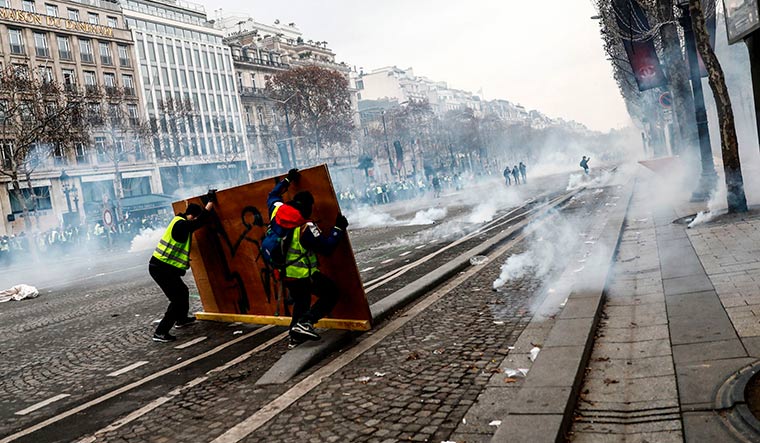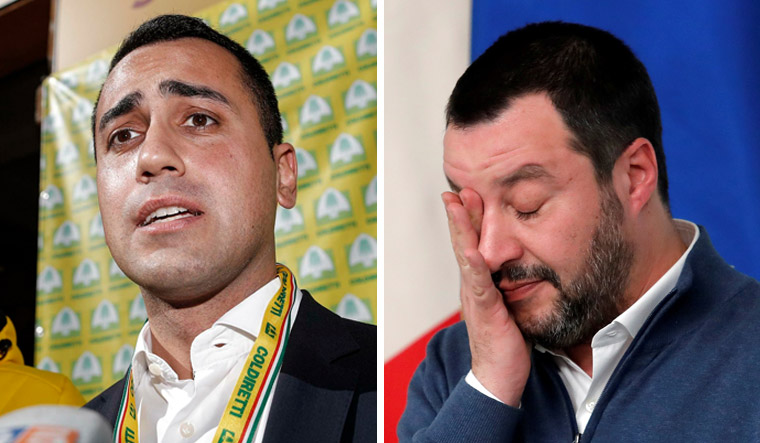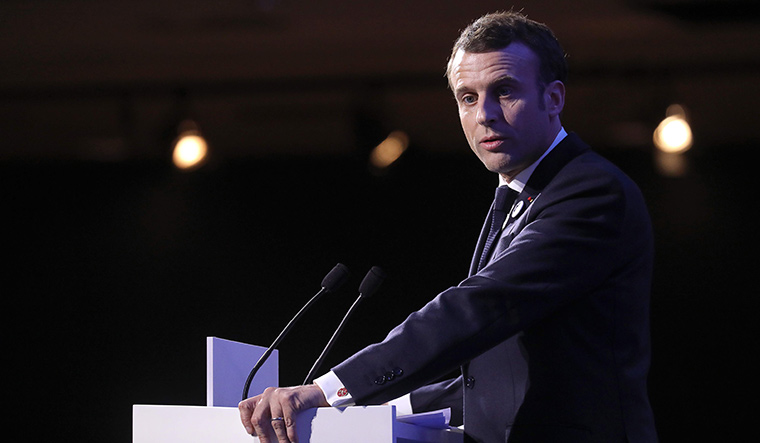ACROSS THE ALPS, France and Italy are jostling and jousting to crown their idea of Europe, while destroying the other’s. Italy’s ruling coalition wants its populist, nationalist, anti-establishment, anti-immigration, Eurosceptic vision to proliferate across the continent. French President Emmanuel Macron aims to eradicate populism, which he said was like “leprosy spreading across Europe”. He wants the progressive, liberal avatar of Europe to triumph.
Which of the two visions will conquer Europe’s soul? The answer will be revealed in the May elections to the European parliament. This is ground zero for the fight between Europe’s populists and progressives, between the Europhobes and the Europhiles. Until then, the volume and venom of the verbal attacks will escalate. Said Marc Lazar, professor at the Paris Institute of Political Studies, “This is a collision of two very different concepts of Europe.”
The collision has consequences. France recalled its ambassador from Rome, an adversarial tactic common enough between India and Pakistan, or Russia and the United States. But it is extraordinary between France and Italy, the European Union’s founding members.
The recall was French retribution for Italy’s “repeated, baseless attacks… without precedent since World War II”, said French official Benjamin Griveaux. Nathalie Tocci, director of the Italian Institute of International Affairs, said such a thing had not happened since 1940 when Italy declared war on France.
The immediate provocation for the recall was Italian Deputy Prime Minister Luigi Di Maio’s rendezvous in a Paris suburb with anti-Macron protesters of the yellow vest movement. Said Dominique Moisi of the Paris-based Institut Montaigne, “This is a sad first in the history of the EU. No country has intervened so openly in the domestic affairs of another…and broken all diplomatic conventions of EU solidarity.”
The 32-year-old Di Maio, who belongs to Italy’s anti-establishment Five Star Movement (M5S), was expressing solidarity with Macron’s opponents. Di Maio told the activists that he was “ready to give the support” they needed to contest the European elections. He blogged and tweeted and also posted photographs with them, announcing that they would meet again in Rome. “A new Europe is being born of the Yellow Vests. Winds of change have crossed the Alps,” said Di Maio. In 1940, Italian dictator Benito Mussolini invaded France in what is called the “Battle of the Alps”. By recalling his envoy, Macron was punishing populism more than rebuking Italy. Many believe that he is the best bulwark against the populist tide sweeping Europe. After all, he was elected as a shield to stop far right leader Marine Le Pen from becoming president.
In Italy, populism flared after the 2008 financial crisis that spawned bankruptcies and unemployment. And then the migrant crisis exploded. History will judge German Chancellor Angela Merkel’s 2015 decision to open Europe’s doors to a million refugees as transformative, altering the continent’s social, cultural and political landscape. The migrant influx inflamed economically-distressed communities. Across Europe, anti-immigration populists surged.
Feeling betrayed by mainstream parties and the corrupt elite, Italian voters turned to their anti-immigration populists, either the far right Northern League or the leftist M5S. The rivals formed an uneasy coalition government after last year’s elections. Italy’s two deputy prime ministers are Di Maio and Matteo Salvini, the fiery head of the League. “These populists are dangerous to Europe’s stability and unity,” said former Italian prime minister Enrico Letta.
Polarisation is their preferred ploy. Populists feast on ‘enemies’ to swell in size and importance. In power, the Italian populists realised that demonising the EU is counterproductive. Faced with recession and insolvent banks, attacking the EU alienates bureaucrats, spooks investors and rattles the fragile economy. On the other hand, Macron is a picture-perfect enemy. The elitist French president personifies the pro-EU establishment they seek to wreck. Their refrain: “The real leprosy at the heart of Europe is the double standards of the French president.”
Rhetoric, personalities and ideologies aside, France and Italy have strong cultural, geographic and economic ties—both are the other’ second largest trading partner. They are Europe’s superpowers of culture. Their distinct creativity and innovation make them compete in everything from art, cars and wine to fashion, food and football.
The rivalry extends to stereotyping and lampooning each other. The Italians are unruly, say the French. The French are disdainful, retort the Italians. “The French are smug even when they are weak,” sneered the right-wing Italian daily Libero.
Now sparring turns to sabotage and old conflicts trigger new battles. Air France reportedly withdrew from a bailout plan to rescue the bankrupt Italian airline, Alitalia. France and Italy wrangle over corporate takeovers (France “conquers”, Italy resents), high-speed rail between Lyon and Turin (France persists, Italy blocks), border checks (France insists, Italy objects). “The result of all these tensions is an explosive environment between France and Italy,” said Jean Pierre Darnis of the Italian Institute of International Affairs.
One third of the Italians feel that France is hostile to them. Immigration is the divisive, emotional issue. Due to its Mediterranean coastline, Italy bears the brunt of refugee arrivals. Migrants try to move further, but neighbouring France pushes them back into Italy, the country of their entry. When Macron criticised Italy for preventing a migrant rescue boat from docking in Sicily, Di Maio reacted angrily, saying Italy would not “accept hypocritical lessons” from the French.
When historical rivalries fester, maggots crawl out. Accusing France of “stealing” Africa’s wealth, Salvini said, “African migrants are flooding Europe because of France’s policy of impoverishment and exploitation of its former colonies.” Said Di Maio, “France has never stopped colonising. I am tired of speaking of the consequences of immigration. I want to start discussing the causes.” French officials replied that many migrants came from the former brutalised Italian colonies, Eritrea and Somalia. Italy blames the 2011 French-led invasion for the disintegration of its former colony Libya into a den of warlords and criminals who now smuggle African migrants into Europe.
Even art is dragged into the fight. The world’s most seen artwork, Leonardo da Vinci’s Mona Lisa, hangs in the Louvre Museum in Paris, observed by 20,000 visitors a day. The Louvre plans a spectacular retrospective to mark Da Vinci’s 500th death anniversary this October. The Italian government had agreed to lend several masterpieces, including the rarely exhibited Vitruvian Man.
But then the populists came to power and now it’s not certain. Lucia Borgonzoni, Italy’s deputy culture minister, said, “Leonardo is Italian, he just died in France.” She accused France of disrespecting Italy and treating it like “a cultural supermarket by sending a shopping list of works it wants to borrow—basically everything. No other country would dare to behave as France had.” The French ambassador is back in his Rome embassy, but the spat is not over yet.
After a spectacular start, Macron is now under siege on all fronts. The Yellow Vest protesters have blunted his image, popularity and reforms. From opposing his fuel tax, the movement has broadened to demand the ouster of their “pro-rich investment banker-president”. His budget deficit is growing and the economy is slowing. While Macron’s ratings are sinking, populists, nationalists, leftists, grassroots activists and street protesters are ganging up against him.
Populists threaten to storm not the Bastille, but the European parliament. With the populists of Poland, Hungary, Italy, Britain, Austria and others waiting to welcome more of their kind, the continent could soon be saddled ironically with the most anti-EU European parliament. Should that happen, more national sovereignty, tougher immigration controls, higher taxes for the rich, wage hikes, better welfare policies, bigger deficits and slower growth are likely. Said Letta, “If the populists win over 25 per cent of the votes in May, it will be the start of a very negative trend that can potentially devastate Europe’s growth.”




